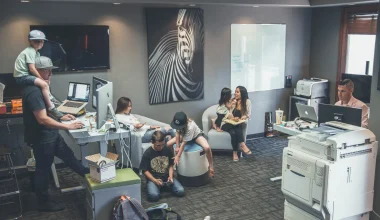You might have heard the saying, “”You only get one chance to make a first impression.”” Well, when it comes to job interviews, this is especially true. You can be an amazing candidate and have all of the qualifications that the company is looking for, but if you walk into the interview room with visible sweat stains under your armpits or you’ve got food stuck in your teeth (or worse), then it’s likely that you won’t get hired. Even if you do everything right during the interview process, sometimes things beyond our control happen—like getting sick or having car trouble on the way there—and we end up being late for our appointments. It happens to everyone at least once! But there are plenty of ways that candidates can avoid these common mistakes before even setting foot in an office building:
Talking too much about yourself.
When you’re interviewing for a position, it’s important to listen to the interviewer and answer their questions. It can be tempting to want to talk about yourself, but if you do that too much during an interview then it’s going to come across as self-centered and insincere. Instead of focusing on yourself, try talking about why you think the job is right for you and what makes your skillset unique.
Ignoring the interviewer.
Don’t let the interviewer do all the talking. You may be nervous, but it’s important to make sure that you are not just sitting there listening and nodding your head. Make sure you ask questions about the job and show interest in what they have to say.
If you don’t know much about something, say so! It’s better to admit your ignorance than pretend like you know everything there is to know about something when really all this does is make them think less of you as a candidate because they think that if they hire someone who doesn’t even understand basic things about their industry or company then how will they handle themselves when things get tough?
Failing to show interest in the job.
I have a friend who once interviewed for a job at a Fortune 500 company. The interviewer asked him why he wanted the job, and he replied with something along the lines of “”I’m looking for something stable””. This answer was not exactly what they were looking for, so my friend didn’t get hired.
Why did this happen? Because he failed to show interest in the company itself or how he could help them grow their business!
Here’s an example: You’re interviewing for an entry-level position at an IT consulting firm; one of your responsibilities will be maintaining customer relationships by making sure that clients are satisfied with their service experience on every interaction (i.e., phone calls). Your interviewer asks why you want this job; instead of saying something generic like “”Because I need money,”” try saying something like “”My experience working with different types of people has taught me how important communication skills are when dealing with customers–which is why I’m excited about joining your team!””
Mumbling and talking too quietly.
Don’t mumble.
Don’t talk too quietly.
It’s not just the interviewer that needs to hear your answers, but also other people in the room who may be listening in on your conversation. If you’re worried about being heard by others, ask if it’s okay for them to listen in on your interview–or better yet, wait until after you’ve been hired before telling everyone about how well (or poorly) things went!
Sitting too far away from the interviewer.
It’s easy to get caught up in the excitement of the interview and forget to pay attention to your surroundings. But there are a few things you can do before, during and after an interview that will help ensure you don’t make any embarrassing mistakes.
One common mistake is sitting too far away from the interviewer–this can make them feel uncomfortable and put them off-guard since they may not be able to hear what you’re saying clearly enough. Try sitting close enough so that they can hear every word clearly without straining their ears (but don’t get too close either). If this isn’t possible because there aren’t enough chairs or desks around for everyone involved in conducting interviews (e.g., HR staff), then ask politely if there’s somewhere else where both parties could sit comfortably together without feeling crowded or separated by distance.””
Not smiling or laughing politely at appropriate moments during the interview.
You’re nervous. You know you are. But there’s no need to show your interviewers that you’re nervous–they can tell by the way you smile at them and laugh at their jokes.
Your smile should be genuine and friendly; it shows that you are approachable, happy, and confident in yourself (which is good!). Your laughter should be polite but not forced–if something doesn’t seem funny or appropriate for a laugh out loud moment, then don’t force yourself!
Arriving late
You’ve heard it before, but it bears repeating: arriving on time is the most important part of your interview. Why? Because if you don’t show up on time, then your interviewer has no idea what kind of person you are. They have no way to gauge how much value they can get out of their time with you or whether or not they even want to hire someone who doesn’t care enough about their own future career prospects to make a simple effort like being punctual.
How do I avoid being late?
If possible, leave early so that there’s no chance of being late due to traffic delays or other unexpected circumstances (which are bound to happen). If this isn’t feasible for whatever reason (e.g., needing transportation), then make sure that any unforeseen delays won’t result in tardiness. For example: “”My train got delayed by 10 minutes because an accident happened on the tracks ahead.””
Not doing your research
While you may be tempted to ask the interviewer about their favorite color, or how they feel about puppies, it’s best not to go down that route. Instead, make sure that your research is thorough and complete before meeting with anyone for an interview.
Research the company: What does their website say? Are there any recent news articles about them? Do they post job openings frequently on LinkedIn or Indeed (or other sites)? Is there information available about the culture of this particular organization–and if so, what does it look like? You should also check out Glassdoor reviews from employees who have worked at this company before–they’ll give you some insight into whether working at this particular organization would be a good fit for you!
Research yourself: Are there any gaps in experience that might turn off potential employers? If so, how can those gaps be overcome during interviews by highlighting other strengths instead (for example: “”I’m not as experienced as some other candidates but here are my skills…””). It’s also important to know what salary range works best with each role based upon location/market rates etc…
Not asking questions
It’s the first thing they’ll tell you: ask questions. It shows that you’re interested in the job and have done your research, but there’s more to it than that. Asking questions shows the interviewer that you are not just a resume, but a person who has thoughts and feelings about things. It also gives them an opportunity for some free coaching on how well prepared you are for this job–and if they think highly enough of themselves as mentors/teachers/advisors/mentees (delete as appropriate), then asking questions will help them decide whether or not they’re willing to take on another student or protégée or whatever other word means “”person who needs guidance.””
Being unprepared or unknowledgeable
Before you go into an interview, it’s important to know the company and position. You should research both thoroughly. If you don’t know much about the company, your interviewer will be able to tell right away–and that could cost you the job offer.
You also want to make sure that you’re prepared for any questions that might be thrown at you during an interview. This means learning as much as possible about what a typical day would look like in this particular role (i.e., what tasks would I be doing? Who else will be working on my team?). It also means figuring out how those tasks align with what interests and skillsets are required by this role so there aren’t any surprises later down the line when it comes time for performance reviews or salary negotiations!
Finally: Do some soul searching before going into interviews so that when asked “”What do YOU want from this job?””; You can confidently answer with something along lines of “”I want X amount per year plus benefits/bonuses based on performance after three months;”” Or whatever else may apply depending upon how far along each candidate has gotten thus far during their search process.””
Overselling yourself
There are some things you should never say in an interview. First, don’t oversell yourself. It’s tempting to tell the hiring manager how great you are at everything and that there is no one else who could do this job as well as you can. But if they don’t hire you for the reason that they think someone else would be better suited for it–and believe me, if they think that about anyone else but themselves then there will be no way around it–then when someone does get hired and does end up doing their work better than expected because of their experience or knowledge base (which happens often), then it will look bad on them!
Also avoid saying anything like “”I want this job so badly I’ll take whatever salary offer is given.”” This makes employers wonder why exactly they should pay more than what was offered; maybe there was another candidate who wanted less money? Maybe there was another candidate who had lower qualifications but also cost less? Or maybe both? It also makes employers feel uncomfortable because now they know how desperate people are nowadays when trying get employment – even though many people claim otherwise – which means fewer applicants may apply next time around due again partly due too much competition among those looking but mostly due too much demand created by those already employed who won’t leave again even though conditions have changed (e.,g., raises).
Showing up in an unprofessional outfit or demeanor.
Wear a suit. You don’t have to wear one every day, but for an interview it’s best to dress like you’re going on an actual date with the person who’ll be hiring you.
Be well groomed and polite. Make sure your hair is trimmed, your nails are clean (or at least short), and that everything about how you look shows that you care about how other people perceive you and want them to see the best version of yourself possible–because this will be their first impression!
Be on time! If there’s any way possible for someone who doesn’t live in close proximity with their job site location (i.e., not within walking distance) then they should take public transportation or ride-sharing services like Lyft/Uber so they can arrive early without worrying about traffic jams causing delays along their commute route while also ensuring they don’t show up late due to unforeseen circumstances such as construction work being done around town during rush hour times which may affect travel routes slightly differently than usual due today’s weather conditions affecting visibility levels around certain intersections where lights might still need adjusting after yesterday’s snowstorm caused some icy spots near bridges overpasses etc…
You can avoid these mistakes by being prepared, asking questions and preparing for the interview.
The best way to avoid these mistakes is by being prepared, asking questions and preparing for the interview.
Conclusion
The best way to avoid these mistakes is to be prepared and ask questions. You should also know what you’re getting into before you go into the interview. If you’re unsure about anything, do some research beforehand so that it doesn’t come up during the conversation!”






